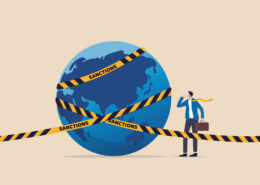Stuck and Seized – Consequences of Forced Labor
Navigating the Complex Web of Global Supply Chains and Human Rights
📅 March 26, 2024
📅 March 26, 2024
Global economies are more interconnected than ever, and human rights abuses can have a profound impact on supply chains and disrupt the flow of goods. Media reports recently indicated that a small, magnetic component used to connect vehicles and computers to networks, has caused a delay in luxury vehicles being shipped by Volkswagen to the United States from Europe and Mexico. The LAN transformer, manufactured by Chinese Sichuan Jingweida (JWD) Technology, was included inside the control systems of vehicles such as Porsche, Audi, and Bentley. The company in December was included on the Department of Homeland Security’s (DHS) Entity List over its alleged use of forced labor. Volkswagen did not receive the LAN transformer directly from JWD Technology, but rather from an intermediary supplier, but the part has to be replaced nonetheless, causing delays in the delivery of the vehicles.
The intermediary supplier was also added to the DHS Entity List in December.
The Uyghur Forced Labor Prevention Act (UFLPA) requires the Homeland Security Department’s Customs and Border Patrol (CBP) to presume that any goods, wares, articles, and merchandise, mined, produced, or manufactured wholly or in part in the Xinjiang Uyghur Autonomous Region (XUAR) of the People’s Republic of China or produced by an entity included on the DHS Entity List are manufactured using forced labor unless the importer can prove otherwise.
The UFLPA Entity List includes entities in XUAR that mine, produce, or manufacture goods using forced labor; work with the government of Xinjiang to recruit, transport, transfer, harbor or receive forced labor; export products of forced labor; and facilities and entities—including the US-designated Xinjiang Production and Construction Corps (XPCC)—that source materiaporl linked to Xinjiang for purposes of the ‘‘poverty alleviation’’ program or the ‘‘pairing-assistance’’ program or any other government-labor scheme that uses forced labor.
The chairs of the bipartisan and bicameral Congressional-Executive Commission on China (CECC) last year called the DHS Entity List additions from June 2023 a “step in the right direction,” but noted that additional action is needed to stop products linked to forced labor from entering the country. Commission chairs also wrote to Undersecretary Robert Silvers, the Chairman of the Forced Labor Enforcement Task Force, noting the need to address “de minimis” imports from fast fashion companies like Temu and SHEIN, which could be used to evade scrutiny, as well as the challenge of transshipment of goods linked to forced labor in Xinjiang.
Media reports in late January noted that Vietnam overtook China in 2023 as the top exporter to the United States of products covered by the UFLPA, indicating that goods linked to forced labor in Xinjiang are increasingly being diverted to Vietnam for reshipment to the United States. Clothing is one of Vietnam’s largest exports, and U.S. officials use isotopic testing to link cotton to specific geographic origins.
Customs officials are authorized to stop imports they suspect are made with raw materials from Xinjiang, regardless of whether they travel into the United States directly from China or through another country. To date, CBP has stopped $26 billion in goods linked to forced labor in Xinjiang, according to DHS statistics. Electronics and apparel comprise the most significant detentions shipped mostly from Vietnam, Malaysia, China, and Thailand.
However, clothing is only the tip of the iceberg in the lengthy list of imports that face the risk of seizure at the U.S. border. Solar panels and tomatoes are also being detained, and agricultural products, traditional Chinese medicines, artificial hair, and even furniture have been listed as high-risk for links to forced labor in Xinjiang.
Electric-vehicle batteries and other auto parts are also facing increasing scrutiny at the border. The Sheffield Hallam University’s Helena Kennedy Centre in December reported that newer model cars likely contain parts that were made by Uyghur forced labor, because the Chinese government has deliberately shifted raw materials mining and processing and auto parts manufacturing into the Xinjiang region, ensuring that international supply chains are held captive to systematic slave labor.
CBP has authority to detain, seize, or exclude goods produced with forced labor, as well as issue civil penalties against those who facilitate such imports, according to a 2022 report to Congress titled “Strategy to Prevent the Importation of Goods Mined, Produced, or Manufactured with Forced Labor in the People’s Republic of China.”
The Biden administration in the coming months plans to expand the UFLPA Entity List, adding companies and state enterprises that are alleged to be involved in the exploitation of forced labor from China. DHS policy adviser Laura Murphy advises importers not to wait for the latest additions, but rather closely examine their supply chains to ensure that the products they purchase do not involve the use of forced labor.
Legislators in Washington are taking note of DHS enforcement actions and urging DHS Secretary Mayorkas to increase enforcement of the UFLPA and take additional steps to stem the flow of goods linked to forced labor in the United States. The Select Committee on the Chinese Communist party flagged that Beijing is forcing Uyghurs to work in coastal seafood processing plants via labor-transfer programs. Forced labor links have also been found in shipments of seafood, gold, and rare-earth minerals, according to the select committee.
CBP in 2022 published operational guidance for importers to help trade stakeholders comply with the UFLPA strategy, including demonstrating due diligence, effective supply chain tracing, and supply chain management measures. The guidance also lists resources to help importers perform supply chain due diligence, tracing, and management.
Firms and financial institutions should increase their due diligence, familiarizing their staffs with the industries and products implicated in forced labor practices, as well as countries that are vulnerable to human trafficking to help determine whether forced labor may have been employed in an exporting jurisdiction. Special attention should be paid to imports from risky jurisdictions, including Malaysia and Vietnam, which China increasingly uses as transshipment hubs for banned products.
Goods and sectors at risk of links to forced labor should also warrant closer examination. Importers and financial institutions should examine existing documentation, paying special attention to shipment routes and possible traditional obfuscation tactics used by illicit actors who violate trade controls. Shipping documents could provide insights into circuitous routes taken by vessels transporting risky products, automatic identification system (AIS) manipulation, and transfers in free trade zones.
Importers should also perform enhanced due diligence research on potential business partners, analyzing transaction history and business activities as well as counterparties and their locations.
UFLPA places the onus on the importer to provide evidence that the goods being shipped to the United States are not linked to force labor. Insufficient due diligence could result in the loss of millions of dollars if imports are seized at the U.S. border or possible civil penalties.










 Crypto Jargon Defined: Bridging the Gap Between Complexity and Comprehensio...
Crypto Jargon Defined: Bridging the Gap Between Complexity and Comprehensio...This site uses cookies. By continuing to browse the site, you are agreeing to our use of cookies.
Accept settingsHide notification onlySettingsWe may request cookies to be set on your device. We use cookies to let us know when you visit our websites, how you interact with us, to enrich your user experience, and to customize your relationship with our website.
Click on the different category headings to find out more. You can also change some of your preferences. Note that blocking some types of cookies may impact your experience on our websites and the services we are able to offer.
These cookies are strictly necessary to provide you with services available through our website and to use some of its features.
Because these cookies are strictly necessary to deliver the website, refusing them will have impact how our site functions. You always can block or delete cookies by changing your browser settings and force blocking all cookies on this website. But this will always prompt you to accept/refuse cookies when revisiting our site.
We fully respect if you want to refuse cookies but to avoid asking you again and again kindly allow us to store a cookie for that. You are free to opt out any time or opt in for other cookies to get a better experience. If you refuse cookies we will remove all set cookies in our domain.
We provide you with a list of stored cookies on your computer in our domain so you can check what we stored. Due to security reasons we are not able to show or modify cookies from other domains. You can check these in your browser security settings.
These cookies collect information that is used either in aggregate form to help us understand how our website is being used or how effective our marketing campaigns are, or to help us customize our website and application for you in order to enhance your experience.
If you do not want that we track your visit to our site you can disable tracking in your browser here:
We also use different external services like Google Webfonts, Google Maps, and external Video providers. Since these providers may collect personal data like your IP address we allow you to block them here. Please be aware that this might heavily reduce the functionality and appearance of our site. Changes will take effect once you reload the page.
Google Webfont Settings:
Google Map Settings:
Google reCaptcha Settings:
Vimeo and Youtube video embeds:
You can read about our cookies and privacy settings in detail on our Privacy Policy Page.
Privacy Policy